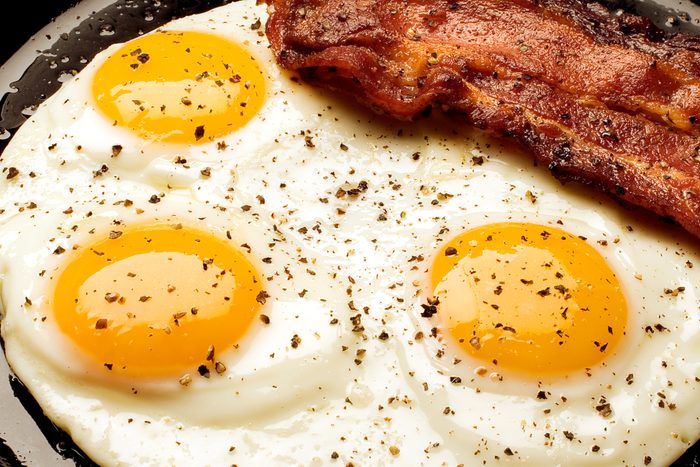Here’s How Much Protein Is in an Egg, an Expert Says
Updated: Nov. 07, 2023

A Cleveland Clinic clinician reveals the secret to enjoying all an egg's protein, minus the saturated fat and cholesterol. Plus, here's why eggs can be powerful for your immune system.
If you’re someone who’s mindful of your protein intake, you probably consider eggs one of the perfect foods—and not just because they’re easy to grab on the go. Eggs are considered to be among the 10 “perfect proteins,” which means they give you “all the essential amino acids, making them equivalent to meat and fish in protein quality,” according to Julia Zumpano, RD, LD, a registered dietitian at the Cleveland Clinic‘s Digestive Disease & Surgery Institute.
While it’s important to consider the saturated fat and cholesterol in eggs (the yolk contains around 200 milligrams of cholesterol), recent research has suggested the cholesterol isn’t considered quite the culprit it once was. The 2015-2020 Dietary Guidelines for Americans did away with their prior guideline to restrict cholesterol consumption to 300 milligrams per day. Today, some Americans are gaining a more nuanced understanding of what saturated fat is, as well as what “bad” cholesterol is.
I Ate Eggs Every Day for a Week—Here’s What Happened
Here’s how much protein is in an egg—plus more egg health benefits
Zumpano says a large egg contains:
- six grams of protein (some eggs may contain seven)
- 75 calories
- five grams of fat
Eggs are also a good source of vitamin D, vitamin E, vitamin B6, calcium, and zinc—some of the most important nutrients for strengthening your immune system!—plus iron and carotenoids.
14 High-Protein Breakfast Ideas That Will Help You Get Trim
Protein in eggs, compared to other foods
The Cleveland Clinic states protein should make up 10% to 35% of an individual’s daily caloric intake. This helps muscle and bone repair, as well as hormone production.
On whether you should eat free-range eggs, organic, conventional, or otherwise, Zumpano says, “[Protein-wise], they’re all about the same.” However if vitamin D is on your mind, it’s been said that free-range chickens and others that get more sunlight lay eggs that pack more vitamin D.
And if you’re curious about whether frying or boiling affects the protein content, Zumpano adds, “Cooking style doesn’t alter the protein.” Just watch the amount of salt you add, and fat content if you cook them in butter or grease.
Here’s how many eggs you should you eat per day
It’s recommended to consume no more than one egg daily. Individuals with high cholesterol are advised to limit their intake to four eggs per week.
That said, egg whites, which don’t contain cholesterol or saturated fat, can be consumed more liberally. Zumpano, referring to the reversal of the 2015 guideline on cholesterol consumption, clarifies that while egg yolks were once incorrectly associated with high blood cholesterol, recent research has shown that foods rich in cholesterol but low in saturated fat can fit well within a balanced diet. If you’re being heart-healthy, the egg white can be the way to go. Egg whites contain zero saturated fat and half the calories, but still all the protein. To still enjoy that color and flavor, crack one egg yolks into a larger proportion of egg whites.
Another trick from nutrition experts is to fold some cottage cheese into the frying pan to add some protein and impressive volume that will really fill your belly. (Never knew cottage cheese could melt? You do now!)
For those with egg allergies or specific dietary restrictions, Zumpano suggests alternatives: “Lean meats, fish, cottage cheese, and Greek yogurt offer comparable high-quality protein.”
For more nutrition updates, subscribe to The Healthy @Reader’s Digest newsletter and follow The Healthy on Facebook and Instagram. Keep reading:


















